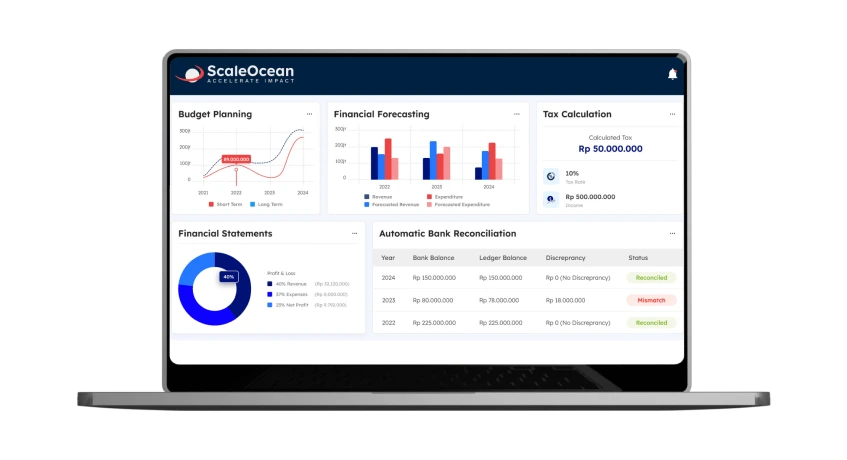Managing your business’s finances no longer requires being tied to a desk or outdated software. Unlike traditional systems that rely on software installations or paper records, cloud accounting software provides a modern, efficient solution for handling financial data online. In Singapore, the adoption of cloud accounting has been particularly pronounced, with the market projected to grow at a compound annual growth rate (CAGR) of 13.4% from 2024 to 2030, reflecting an increasing recognition of its benefits among local businesses.
Cloud accounting lets businesses securely store and manage financial data like income, expenses, assets, and liabilities on cloud servers. It allows easy access from any device with an internet connection, improving efficiency and enabling real-time decision-making. In the following parts, we will elaborate on what cloud accounting is and how it may help businesses transform their financial management.
What is Cloud Accounting?
Cloud accounting is a web-based solution that enables businesses to manage and store financial data securely online, replacing the need for traditional software installations or physical records. By leveraging cloud servers, it allows users to view and modify financial information, such as income, expenses, and liabilities, from any device with an internet connection.
This approach improves efficiency, allows for real-time data sharing, and promotes collaboration across teams, regardless of location. With its ability to streamline processes and provide up-to-date insights, cloud accounting is transforming financial management for businesses worldwide.
Cloud Accounting Features
Cloud accounting solutions provide a variety of powerful features that simplify financial management and increase business efficiency. These features make cloud accounting an essential tool for modern businesses. Let’s look into these key features below.
1. Seamless Accessibility
Cloud accounting enables businesses to access their financial data anytime, anywhere, using any internet-connected device. This convenience supports remote work, enhances collaboration across teams, and ensures that stakeholders can make informed decisions based on real-time data, no matter where they are.
2. Robust Security Measures
Built-in data encryption, automatic backups, and stringent user access controls ensure that sensitive financial information remains protected. By maintaining data integrity and reducing the risk of data breaches, cloud accounting provides a secure environment for managing critical financial records.
3. Integrated Business Tools
Many cloud accounting platforms can integrate with other critical business applications like CRM and inventory management systems. This integration creates a unified ecosystem, helping businesses streamline workflows, improve data accuracy, and enhance overall efficiency.
4. Automated Processes
Cloud accounting makes it possible to automate repetitive processes such as creating invoices, classifying transactions, and updating financial statements. Finance teams may improve efficiency by focusing on strategic activities through automation, which minimizes errors and human entry.
Also read: Reasons Why ScaleOcean is the Best ERP Software Singapore
The Benefits of Cloud Accounting
Cloud accounting software delivers a range of benefits that improve efficiency, decision-making, and security. Let’s take a deeper look at the main benefits it provides to businesses.
1. Real-Time Access
Cloud accounting enables users to track their financial health in real time, offering instant insight into income, spending, and cash flow. This real-time visibility enables faster, more informed decision-making and helps businesses stay agile in a constantly changing market environment.
2. Operational Efficiency
By automating routine tasks such as invoicing, transaction categorization, and reporting, cloud accounting software reduces manual effort. This streamlining not only saves time but also increases productivity, allowing finance teams to focus on higher-value activities and strategic initiatives.
3. Data Security
Leading cloud accounting companies include strong security features such as data encryption, firewalls, and automated backups. These features protect sensitive financial information from unauthorized access and reduce the risk of data loss, giving businesses peace of mind about the safety of their records.
4. Scalability
As a company expands, its financial management requirements change. Using the best accounting software Singapore offers, businesses can easily scale by adding new users and functionalities without the need for expensive infrastructure upgrades. This adaptability ensures the system grows alongside the business, meeting changing demands seamlessly.
How Cloud Accounting Works?

Cloud accounting operates through online platforms that store and process financial data in real time. By leveraging connectivity, it supports businesses with immediate access, secure data handling, and automated updates. Here are the core components behind this efficient approach.
1. Web-Based Access
Cloud accounting solutions are accessed using a web browser or mobile app, eliminating the need for extensive software installations. Users simply log in with their credentials, ensuring financial data is available on demand. This web-based design supports greater mobility, enabling stakeholders to manage accounts from any location with internet access.
2. Secure Cloud Storage
All financial information is housed on remote servers managed by specialized data centers. These providers typically implement multiple layers of security, including encryption, firewalls, and frequent strict vulnerability assessments. By hosting data in the cloud, businesses avoid local hardware risks, reduce maintenance expenses, and ensure vital financial records remain protected.
3. Automatic Data Updates
Cloud accounting platforms often connect with banks, payment processors, and e-commerce channels to retrieve and update transaction data automatically. This synchronization eliminates manual data entry, minimizes errors, and keeps financial records current. By integrating relevant data sources, businesses gain a consolidated view of their finances, leading to better operational insights.
4. Real-Time Collaboration
Because information is stored in one central location, team members can collaborate on financial tasks without conflicts. Multiple users can review, edit, or share data simultaneously, ensuring everyone has the most up-to-date figures. This integrated real-time system also facilitates speedier approvals, transparent communication, and more effective workflow procedures across departments.
5. Integration with Other Systems
Modern cloud financial systems can integrate with CRM, inventory control, and payroll platforms. This interoperability centralizes key operational data, reducing redundant processes and improving overall accuracy. By synchronizing information across multiple business functions, organizations benefit from a holistic view of performance, ultimately enabling more strategic and data-driven decisions.
Also read: 4 Major Phases of ERP Implementation for Business Success
Challenges of Adopting Cloud Accounting
Adopting cloud financial systems presents opportunities for businesses to streamline financial processes, but it also introduces specific challenges. Understanding and overcoming these challenges facilitates a smoother transition.
1. Cyber Security
Cloud accounting system provide robust security features, but businesses remain vulnerable to cyber threats like hacking and data breaches. To prevent risks, companies must set strong password restrictions, enable two-factor authentication, and update software on a regular basis.
2. Regulatory Compliance
Cloud accounting providers must comply with local and global data privacy regulations. Businesses in Singapore should ensure their chosen provider adheres to standards like GDPR and local laws governed by IRAS Singapore, helping them maintain compliance and avoid potential penalties.
3. Integration with Other Systems
Integrating cloud accounting solutions with existing business applications can be challenging, especially when legacy systems are involved. Customization or third-party tools may be necessary to enable seamless interoperability and data consistency.
4. Cost Management
Transitioning to cloud accounting may involve subscription costs and potential fees for additional features. Businesses should evaluate their budget, calculate the return on investment, and choose scalable plans that align with their long-term financial strategy.
Best Cloud Accounting Solutions in Singapore
Cloud accounting solutions significantly benefit Singaporean businesses by simplifying financial processes. These solutions often include features like expense tracking, invoicing, and real-time reporting, which will be discussed in the following subheadings.
1. ScaleOcean Accounting System Singapore

ScaleOcean’s cloud accounting software is a cutting-edge solution designed to simplify financial management for businesses of all sizes. With a friendly user interface, the software ensures ease of use for both seasoned professionals and beginners. It boasts an extensive range of features, including real-time inventory tracking, automated financial reporting, and seamless integration with various business operations.
These technologies offer businesses to keep accurate records, streamline procedures, and make data-driven choices while leveraging the flexibility and security of cloud technology. To help businesses experience its benefits firsthand, ScaleOcean offers free demo, providing a hands-on opportunity to explore its features and functionality.
In addition to its robust software, ScaleOcean offers extensive consulting services through its skilled team of professionals. These experts collaborate extensively with clients to understand their specific business requirements and suggest customized solutions. The clear total cost (CTC) analysis ensures transparency, enabling businesses to make confident and well-informed investment decisions. With this risk-free strategy, businesses can securely invest in a solution that meets their specific needs.
2. QuickBooks Online Accounting System
QuickBooks is an accounting software tailored to help small and medium-sized businesses streamline financial operations efficiently. It includes features like invoicing, expense tracking, payroll management, and financial reporting, all through an intuitive interface.
Renowned for its capabilities and cross-industry adaptability, QuickBooks’ cloud-based platform enables real-time collaboration, granting access to financial data from any location. Furthermore, it integrates smoothly with various third-party tools, ensuring flexibility to suit diverse business requirements.
3. FreshBooks Cloud Financial Systems
FreshBooks is a cloud-based accounting software designed for small business owners, freelancers, and sole proprietors. It streamlines financial tasks with features like invoicing, expense tracking, time tracking, and financial reporting through a simple, user-friendly interface.
Its intuitive design is suitable for users without accounting expertise, helping entrepreneurs focus on business growth. With comprehensive tools and affordable pricing, FreshBooks is a budget-friendly choice for small businesses.
4. Sage Business Cloud Accounting
Sage Business Cloud Accounting is a cloud-based financial management solution tailored to simplify accounting for small and medium-sized businesses. It provides features like invoicing, expense tracking, cash flow monitoring, and financial reporting through an easy-to-use interface.
Known for its scalability, Sage is ideal for growing businesses. Its intuitive design streamlines financial processes, enabling business owners to prioritize operations. Furthermore, it integrates effortlessly with third-party applications, offering flexibility to accommodate diverse business requirements.
5. Zoho Books Cloud Financial Software
Zoho Books is a cloud-based accounting software designed for small and medium-sized businesses to streamline financial management. It includes features like invoicing, expense tracking, project management, and financial reporting, all through an easy-to-use interface.
Known for its extensive capabilities, Zoho Books can be the choice for Singaporean businesses seeking a cost-effective solution. Its smooth integration with other Zoho tools creates a unified platform for efficient business operations.
Also read: Understanding Cloud ERP and Its Benefits for Businesses
Conclusion
Cloud accounting transforms financial management by boosting efficiency, accessibility, and real-time insights. Popular platforms like QuickBooks, FreshBooks, Sage Business Cloud Accounting, and Zoho Books offer robust features to help businesses in Singapore automate tasks, maintain data security, and make informed decisions. Yet, integration challenges, cost considerations, and cybersecurity must be managed to fully leverage cloud accounting.
ScaleOcean accounting software offers real-time inventory tracking, automated reports, and smooth integration for businesses needing a tailored solution, ensuring flexibility and security. To simplify adoption, ScaleOcean offers a free demo and consultation, letting businesses explore its features risk-free. This platform is more than a tool, it’s a trusted partner for achieving business goals.



 Click to Chat!
Click to Chat!